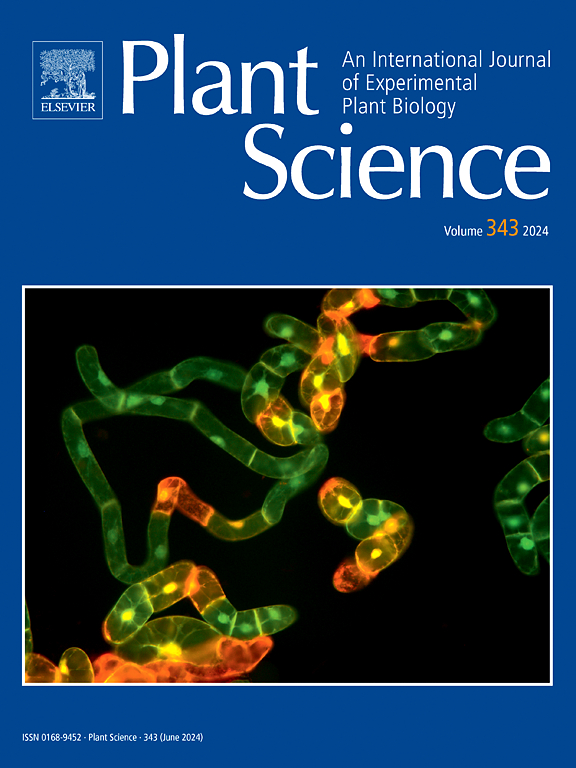连接点:肌醇加氧酶途径在细胞壁,植酸和抗坏血酸生物合成途径中的作用,及其对未来作物发展的潜力。
IF 4.1
2区 生物学
Q2 BIOCHEMISTRY & MOLECULAR BIOLOGY
引用次数: 0
摘要
肌醇作为一种重要的代谢物,参与了植物的多种生物合成途径。肌醇加氧酶(MIOX)将肌醇转化为d -葡萄糖醛酸,这是植物细胞壁中果胶和半纤维素成分的前体。以前,肌醇途径在抗坏血酸生物合成中的作用及其与重要生物合成网络(如植酸生物合成)的相互作用已经被讨论过。提高抗坏血酸含量不仅是为了提高作物的营养品质,而且是为了生产出能够抵抗环境胁迫的作物。MIOX途径与抗坏血酸、植酸和细胞壁糖产生之间的相互作用显著影响植物的生长发育。因此,更好地了解这些植物通路之间的相互联系对于作物植物的发育没有任何负面的发育影响至关重要。目前的研究解决了这一知识空白,并对植物中MIOX途径与细胞壁、植酸和抗坏血酸生物合成途径的关系提出了一个特殊的观点。此外,它还提供了有关MIOX途径基因的信息,这些基因已显示出在植物中提供对非生物胁迫(如热、冷、干旱和盐)的耐受性的潜力。本文章由计算机程序翻译,如有差异,请以英文原文为准。
Connecting the dots: Role of myo-inositol oxygenase pathway in cell wall, phytic acid, and ascorbic acid biosynthesis pathways, and its potential for future crop development.
Myo-inositol serves as a key metabolite that contributes to the numerous biosynthetic pathways in plants. The enzyme myo-inositol oxygenase (MIOX) converts myo-inositol into D-glucuronic acid, a precursor to pectin and hemicellulose components of the plant cell wall. Previously, the role of myo-inositol pathway in ascorbic acid biosynthesis and its interactions with crucial biosynthetic networks such as phytic acid biosynthesis have been discussed. Nowadays, focus is increasing on enhancing the ascorbic acid content, not just to improve the nutritional quality but also to produce crops that can withstand environmental stress. The interplay between MIOX pathway, ascorbic acid, phytic acid and cell wall sugars production significantly affect the plant growth and development. Therefore, a better understanding of the interconnection between these plant pathways is crucial for the development of crop plants without any negative developmental effects. The current study addresses the knowledge gaps and present a particular perspective on the relation of MIOX pathway with cell wall, phytic acid and ascorbic acid biosynthesis pathways in plants. Additionally, it also provides information on MIOX pathway genes that have shown potential in providing tolerance to abiotic stresses (such as heat, cold, drought and salt) in plants.
求助全文
通过发布文献求助,成功后即可免费获取论文全文。
去求助
来源期刊

Plant Science
生物-生化与分子生物学
CiteScore
9.10
自引率
1.90%
发文量
322
审稿时长
33 days
期刊介绍:
Plant Science will publish in the minimum of time, research manuscripts as well as commissioned reviews and commentaries recommended by its referees in all areas of experimental plant biology with emphasis in the broad areas of genomics, proteomics, biochemistry (including enzymology), physiology, cell biology, development, genetics, functional plant breeding, systems biology and the interaction of plants with the environment.
Manuscripts for full consideration should be written concisely and essentially as a final report. The main criterion for publication is that the manuscript must contain original and significant insights that lead to a better understanding of fundamental plant biology. Papers centering on plant cell culture should be of interest to a wide audience and methods employed result in a substantial improvement over existing established techniques and approaches. Methods papers are welcome only when the technique(s) described is novel or provides a major advancement of established protocols.
 求助内容:
求助内容: 应助结果提醒方式:
应助结果提醒方式:


